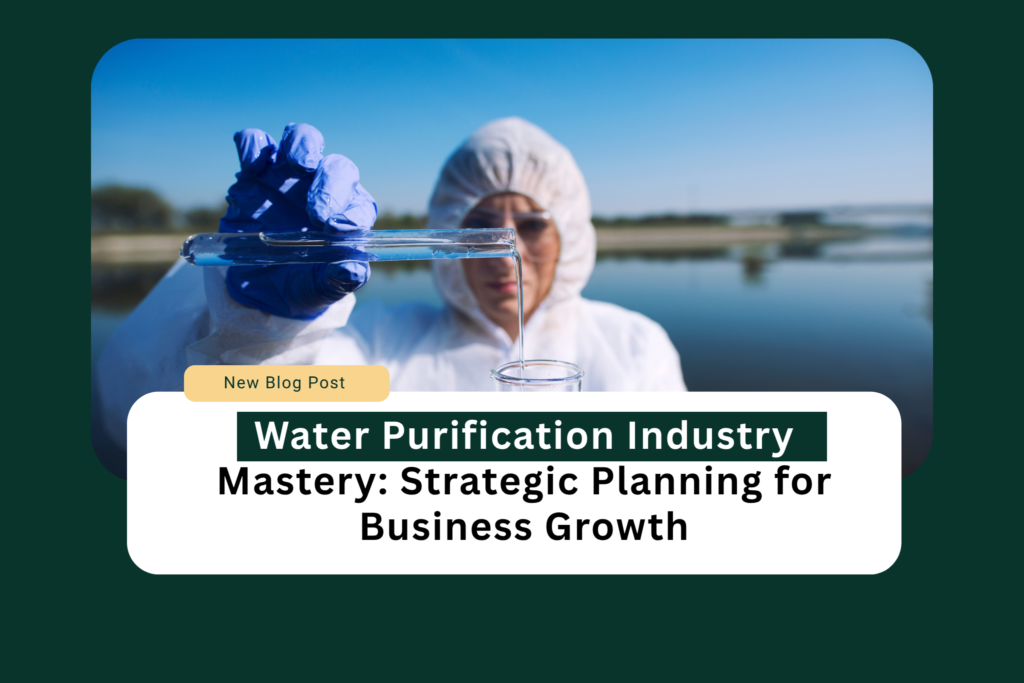Introduction
Water purification functions as a vital point where environmental responsibility meets entrepreneurial prospects throughout the global market. The escalating water quality concerns make well-designed water purification business plans progressively more valuable. A recent industry report states that 1.8 billion people will experience water shortages within the next ten years in areas affected by scarcity, which demonstrates significant potential for groundbreaking water purification techniques.
Understanding Water Purification Market Landscape
The water purification industry recorded massive expansion in recent years. Grand View Research reports that water treatment chemicals will grow to $59.4 billion by 2027 while showing a yearly advancement of 4.3% through a compound annual growth rate. The market continues to expand due to rising industrial requirements for water treatment together with increasing environmental awareness and expanding water contamination issues throughout different industries.
Market Segmentation and Opportunity Analysis
An effective water purification business needs to select its specific target markets properly. The Environmental Protection Agency (EPA) identifies residential water treatment systems as one of several segments, along with industrial water purification and municipal water systems and specialized industrial applications. Every segment in the water sector demands specific solutions because they present separate difficulties and potential market openings.
Technological Considerations in Water Purification
The foundation of competitive success in the water purification business depends on technological advancements. The current market leaders operate through reverse osmosis combined with ultraviolet disinfection along with advanced oxidation processes for their filtration systems. According to the Water Research Foundation, innovative purification systems demonstrate the ability to eliminate 99.99% of water pollutants including new contaminants such as microplastics as well as pharmaceutical residues.
pollutants,
Financial Planning and Investment Requirements
Any water purification enterprise depends on a solid financial foundation for its success. The initial expenses needed for setting up water purification systems depend heavily on the technology choice along with the business size. The startup budget for small residential water treatment facilities ranges between $50,000 and $100,000, but industrial operations need investments of more than $500,000. A financial plan needs to include spending for equipment purchases along with research and development costs, marketing expenses, and operational expenditures.
Regulatory Compliance and Certification
Water purification business planning needs to manage the intricate regulatory framework as one of its fundamental elements. The Safe Drinking Water Act, together with state-specific regulations, enforces strict conditions that apply to water treatment methods along with technological requirements. Every enterprise needs to obtain NSF International certification along with EPA compliance documentation for proper business operation. The acquisition of these credentials guarantees legal operation and simultaneously establishes trust with customers.
Marketing and Customer Acquisition Strategies
A water purification business depends on effective marketing approaches to succeed. Successful businesses, according to specifically work on potential customers how water quality risks exist alongside the practical advantages of state-of-the-art purification systems. Water purification businesses should adopt digital promotion strategies and specific advertising methods alongside environmental partnerships to build trust with customers and attract new clients.
Operational Planning and Infrastructure
Multiple factors need to be considered when creating a complete operational strategy. The business development process requires selecting proper purification systems alongside the creation of supply networks and service execution systems. Profitable companies implement flexible operational structures that enable them to react to market trends together with technological breakthroughs.
Sustainability and Environmental Considerations
Current water purification companies need to make environmental sustainability their top priority. The International Water Association demands industry focus on technology development that minimizes waste while reducing energy usage and promotes bigger environmental conservation efforts. This method works toward environmental protection while simultaneously attracting customers who value sustainability together with corporate clients.
Risk Management and Contingency Planning
The water purification industry requires complete risk management as its foundation. Water purification companies face risks because of outdated technology and regulatory modifications along with variable market environments. Successful ventures develop thorough contingency protocols to handle potential difficulties, which consist of technological and market expansion strategies as well as money conservation plans along with innovation leadership schemes.
Technology Integration and Future Innovations
Water purification technology will advance through uninterrupted technological development. Modern water treatment operations are revolutionized through the implementation of emerging technologies, which include nanotechnology and artificial intelligence. The market success of the future will belong to businesses that invest in research development alongside maintaining their ability to adapt quickly to new technological breakthroughs.
Conclusion
To develop successful water purification offerings, one must implement an approach that combines technological developments with strategic market planning under market conditions understanding. Entrepreneurs who attend to every section of their business plan establish ventures which simultaneously create substantial economic value while resolving crucial worldwide water issues.
We invite you to share your thoughts and experiences in the water purification industry. Your feedback is invaluable in helping us continue to provide comprehensive insights for aspiring entrepreneurs. Please comment below and share this article with others interested in water purification business opportunities.
FAQs
What amount of money does one need to invest at the beginning for launching a water purification business?
Businesses that purify water need an initial investment between $50,000 for residential operations and more than $500,000 for industrial systems. Water purification business costs are determined by equipment expenses, certification fees, marketing expenses, and operational infrastructure requirements.
For starting a water purification business what certifications must owners obtain?
A water purification business needs three main certifications: NSF International certification and EPA compliance documentation alongside state-level water treatment permits. The credentials demonstrate both technical performance and regulatory conformity of water purification systems.
What are the financial returns possible in water purification business operations?
The profitability of a water purification business falls within 20-40% profit margin depending on market position and operational performance. The market for industrial and commercial water treatment solutions generates better revenue potential than residential services do.
What are the fundamental technologies required for water purification?
The key technologies for water purification consist of reverse osmosis together with ultraviolet disinfection and advanced oxidation processes and emerging nanotechnology solutions. Companies that achieve the best results through business operations dedicate ongoing resources to technological advancements.
The best market segments for opportunities exist where?
The most promising market segments for water purification businesses exist in industrial water treatment alongside municipal water systems and residential purification and specialized industrial applications. The different market segments exhibit different market conditions and business opportunities.
Read More : https://theacechronicle.com/seminar-business-plan/








